|
|
|
Sort Order |
|
|
|
Items / Page
|
|
|
|
|
|
|
| Srl | Item |
| 1 |
ID:
189469


|
|
|
|
|
| Summary/Abstract |
The coronavirus, also known as COVID-19, has dramatically disrupted the global community, causing more than 6 million deaths worldwide and changing daily lifestyles for billions. Two Asian countries, South Korea and Taiwan, have been able to maintain low rates of infections and fatality. Five articles are collected in this special section to examine their successful experiences and the challenges they faced.
|
|
|
|
|
|
|
|
|
|
|
|
|
|
|
|
| 2 |
ID:
177080
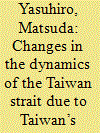

|
|
|
|
|
| Summary/Abstract |
The objectives of this paper are to elucidate Taiwan’s successful COVID-19 measures as well as the conditions surrounding the deterioration of Cross-Strait relations and to identify future prospects. The author has demonstrated the success of Taiwan’s Novel Coronavirus countermeasures and shown that China’s increasingly hardline policies toward the rest of the world and Taiwan in particular have contributed to unstable Cross-Strait relations. First, Taiwan’s successful anti-epidemic policies have done much to boost Taiwanese self-esteem. Second, within Taiwan, the majority view identified China as the source of the trouble, not the DPP. Third, with US–China relations deteriorating even further as a result of the Novel Coronavirus pandemic, the US began to actively “showcase” Taiwan’s success. Fourth, China’s Taiwan policy is expected to remain deadlocked for the time being. US–China relations are increasingly worsening, Taiwanese public opinion is trending toward increasing distance from China, and all that remains of China’s Taiwan policy is “placing hope on the mainland itself.” Thus, the Cross-Strait relationship is expected to continue deteriorating well into the future.
|
|
|
|
|
|
|
|
|
|
|
|
|
|
|
|
| 3 |
ID:
182524
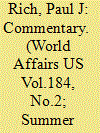

|
|
|
| 4 |
ID:
181685
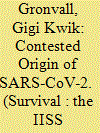

|
|
|
|
|
| Summary/Abstract |
This article describes what is known about the origin of SARS-CoV-2, with implications for policy, biological research and public-health surveillance. Theories about the origin include a natural emergence; a laboratory accident with a naturally harvested strain; an accident with a naturally harvested strain modified in a laboratory; and the deliberate creation of a biological weapon. While available scientific evidence points to a natural zoonotic event as the origin of SARS-CoV-2, this paper recommends specific steps governments and scientific institutions should take to address uncertainties about the origin of the COVID-19 pandemic, as well as to make all potential causes for a pandemic less likely to produce one in the future. Immediate steps include promoting international scientific collaboration, addressing scientific misinformation and disinformation, fully implementing ‘One Health’ and reining in the illegal wildlife trade.
|
|
|
|
|
|
|
|
|
|
|
|
|
|
|
|
| 5 |
ID:
172952
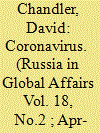

|
|
|
| 6 |
ID:
172955


|
|
|
| 7 |
ID:
172950


|
|
|
| 8 |
ID:
186877
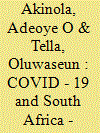

|
|
|
|
|
| Summary/Abstract |
While South Africa–China relations were only formalized in 1998, relations between these states date back to the 1800s. South Africa's quest for sustainable development through partnerships with global powers motivated its close ties with China. The 2015 Cape Town Declaration committed the two countries to improve health facilities and disease control. The coronavirus (COVID-19) pandemic presents an opportunity to rethink this partnership. Drawing on desktop research, this article engages the reality of COVID-19 and explores South Africa–China relations in the context of the pandemic. The emergence of the virus in China, its rapid spread, and the high fatality rate have had devastating repercussions across the world. This article argues that Beijing's response to COVID-19 raises more questions than it answers. The outbreak of the virus in China, its response, and emerging cases of racism and xenophobia against Africans in China also raise concerns about the future of South Africa–China relations.
|
|
|
|
|
|
|
|
|
|
|
|
|
|
|
|
| 9 |
ID:
175069
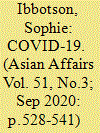

|
|
|
|
|
| Summary/Abstract |
In this article I will discuss three areas: Central Asian countries' immediate responses to the COVID-19 crisis, including the current public health situation; the short- and mid-term economic impact of the global shutdown and slump in oil prices; and what the countries' responses demonstrate about their regimes, relationships, and places in the world today. I will compare and contrast the five countries throughout the article, drawing attention to the most relevant and interesting examples of policy and outcome, with supporting statistics and commentary as relevant. Kazakhstan, Kyrgyzstan, Tajikistan, and Uzbekistan will get the bulk of the analysis, which is a reflection of the difficulty of getting credible information about the COVID-19 situation in Turkmenistan.
|
|
|
|
|
|
|
|
|
|
|
|
|
|
|
|
| 10 |
ID:
175070


|
|
|
|
|
| Summary/Abstract |
South Asia, a poor, densely-populated region with weak public health infrastructure, appears highly vulnerable to COVID-19. But cases and fatalities have so far remained relatively low in the region. The low case-load is unlikely related to climate, malaria exposure or tuberculosis vaccination, as has been suggested. Insufficient testing in South Asian countries has probably disguised the true extent of the outbreak. Younger demographics might also explain the region's low fatality rate. Although the health impact of coronavirus has not been as devastating as some feared, the social, economic and political consequences are already severe. The pandemic is exposing and exacerbating some of the region's major weaknesses, including poverty, gender inequality, persecution of minorities, authoritarian governance, and geopolitical competition. In that sense, coronavirus is both a “mirror”, which reflects South Asia's problems, and a “catalyst”, which intensifies them.
|
|
|
|
|
|
|
|
|
|
|
|
|
|
|
|
| 11 |
ID:
179722
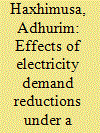

|
|
|
|
|
| Summary/Abstract |
The coronavirus pandemic (COVID-19) has led to a massive collapse in economic activity and energy demand, with the result of significant emissions reductions at a global scale. However, the existing literature investigating abatement from COVID-19 mainly overlooked the overwhelming emissions reduction in Europe's power sector. We address this by assessing the intricate relationship between electricity demand shocks and heterogeneous generation technologies in the power sectors of 16 major European economies during January to March 2020. We apply an econometric model in an instrumental-variables framework. In a first step, we assess the impact of COVID-19 infections on electricity demand, and in a second step how this translates into emissions abatement. We find that, during full lockdown, COVID-19 reduced electricity demand by 19% and carbon emissions by an astonishing 34% per hour, whereas there is severe country heterogeneity depending on the electricity supply structure and demand shock intensity. From our estimates, we predict that power sector emissions fell by 18.4% in 2020. Our results reveal the importance of a carbon price, so that a demand reduction can offset large amounts of emissions by displacing coal at the margin. We derive several policy implications from our analysis to draw lessons from the pandemic.
|
|
|
|
|
|
|
|
|
|
|
|
|
|
|
|
| 12 |
ID:
192076


|
|
|
|
|
| Summary/Abstract |
The COVID-19 pandemic poses fundamental challenges to the ways that the discipline of International Relations makes sense of our world. Framing the pandemic as both a social disaster and as part of an ongoing polycrisis, this work argues that existing responses to COVID-19 are, whatever their insights, partial and limited, predicated on assumptions about how we know the world now shown to be problematic. This situation calls less for some defined incremental change and more for a period of uncomfortable disciplinary reflection on the boundaries, purposes and value structures that shape IR.
|
|
|
|
|
|
|
|
|
|
|
|
|
|
|
|
| 13 |
ID:
186835
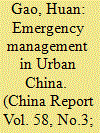

|
|
|
|
|
| Summary/Abstract |
To combat the coronavirus epidemic, the city at the epicentre, Wuhan, China, was placed under strict lockdown in 2020 for 76 days. Unlike past emergency response situations in China, government-organised Residents’ Committees (RC), property management companies, and other community institutions played an unusually prominent role in enforcing the lockdown, providing essential services, and maintaining public order. This article explains the role of community institutions in emergency management in China through case studies of the 2008 earthquake in Chengdu, the 2016 flood in Wuhan, and later, the 2020 coronavirus outbreak. Drawing on databases of media reports and individual accounts, I argue that the administrative and coercive power of community institutions stems from their spatiality—from being embedded in gated residential communities, maintaining contact and familiarity with residents, and having control over physical structures. During earthquakes and floods, when the physical space that give community institutions power is changed and destroyed, the role of these organisations in emergency response diminishes. However, when facing an epidemic, in which structured physical space is not only unchanged but also reinforced, community institutions take the lead.
|
|
|
|
|
|
|
|
|
|
|
|
|
|
|
|
| 14 |
ID:
174741


|
|
|
|
|
| Summary/Abstract |
This article considers the potential for the COVID-19 pandemic to represent an epochal moment in international politics, one which China can use as a window to maximize its international order-building efforts. It is argued that China’s putative international order-building efforts to date have faltered, in part, due to an inability to create meaningful friendships with prominent international powers. However, the COVID-19 pandemic allows China to play a key humanitarian role in heavily afflicted countries and, through this, perhaps an opportunity to forge more meaningful friendships. It is argued that China is trying to attach its concept of friendship to its humanitarian assistance while also stepping into the clear international leadership void that exists at the moment. This is not without faults or missteps, but the lasting impact could be significant for international politics and the global order.
|
|
|
|
|
|
|
|
|
|
|
|
|
|
|
|
| 15 |
ID:
182427


|
|
|
|
|
| Summary/Abstract |
The emergence of the novel coronavirus (COVID-19) in November 2019 has nearly brought the world to a halt. Recording her first COVID-19 case on 27 February 2020, the Nigerian government’s default response to the pandemic was to lock down major parts of the country, among other measures. Despite the nationwide lockdown, inter-state travel continued unabated as many travellers bribed their way through the different checkpoints mounted by security agencies. As a result of the prevalence of ‘normed corruption’, the lockdown only created opportunity for brazen extortion by law enforcement officials. Using the institutional corruption theory as our framework of analysis, and coupled with the use of both primary and secondary data generated during the lockdown, the paper noted that entrenched culture of extortionate policing in the ranks of security forces meant that arrest and prosecution of violators of the lockdown became a distant concern. The result is that COVID-19 suspects or carriers travelled from one state to another without being detected. It concludes that Nigeria should leverage lessons learned from policing COVID-19 in framing future responses in containment
|
|
|
|
|
|
|
|
|
|
|
|
|
|
|
|
| 16 |
ID:
182573


|
|
|
|
|
| Summary/Abstract |
The paper focuses on the COVID-19 as a stress test to the Sino-Russian strategic partnership: has it driven Russia and China closer together, farther apart, or made no difference? Employing content analysis of official Russian discourse as expressed by the Kremlin, the Government, and the Ministry of Foreign Affairs (MFA), both via their official web pages (104 online publications) and Twitter accounts (260 tweets), this study focuses on the Russian twiplomacy as a more suitable mean to reflect the real-time changes of an evolving crisis. The analysis demonstrates that the Sino-Russian relationship extends beyond the “axis of convenience.” It does not, however, correspond to the support expected from a consolidated (comprehensive) strategic partnership, nor does it achieve the intensity of soft balancing (vis-à-vis the USA) in a particularly polarized and politicized international context.
|
|
|
|
|
|
|
|
|
|
|
|
|
|
|
|
| 17 |
ID:
177558


|
|
|
|
|
| Summary/Abstract |
The outbreak of Covid-19 has been highly racialised and stigmatised around the world based on the origin of the virus and its highly infectious nature. Profiling of Asians or mongoloid looking individuals as a suspect carrier of the virus and the resultant taunts and discriminations occur worldwide. In India, the pandemic has reinforce racism against Northeast Indians, which the country has been grappling with this social problem in the last one decade or so. Such discriminations were overt acts of racial prejudice that primarily stems from the nonrecognition or misrecognition of Northeast Indians, who are mainly mongoloid race, as Indians. During the pandemic, the fight by Northeast Indians was with the mindset of the rest of Indians as much as the virus itself. It was a fight not only against the presumption of being ‘non-Indian’ with negative affiliation, or worse ‘unwanted Indians’, but also to get due recognition and acceptance as equal Indians. The absence of stringent anti-racism laws may have resulted in the pervasiveness of overt acts of racism during the pandemic. However, such actions are best understood on the structural elements that underpin Indian societies. The legal measures to address this social problem will reduce overt acts of racism but addressing covert racial acts, which are structural in nature, is a long way to go.
|
|
|
|
|
|
|
|
|
|
|
|
|
|
|
|
| 18 |
ID:
174742


|
|
|
|
|
| Summary/Abstract |
Among various geopolitical repercussions of the COVID-19 pandemic are redefinitions of the short-term priorities of many international organizations. Among others, the European Union (EU) and North Atlantic Treaty Organization (NATO) are becoming absorbed by new internal challenges, and are thus even less interested in further enlargement than before. Against this background, Kyiv, Tbilisi, and Chisinau, as well as their Western friends, need to seek new paths to increase the three countries’ security, resilience, and growth before their accession to the West’s major organizations. Above all, an alternative way to decrease Ukraine’s current institutional isolation is to develop more intense bilateral relations with friendly states across the globe, including Germany and the United States. In Eastern Europe, moreover, Ukraine, Georgia, and Moldova should attempt to create new multilateral networks with post-communist member countries of NATO as well as the EU, and try to become part of such structures as the Three Seas Initiative or Bucharest Nine group.
|
|
|
|
|
|
|
|
|
|
|
|
|
|
|
|
| 19 |
ID:
173037


|
|
|
|
|
| Summary/Abstract |
The United States should meet the People’s Republic of China’s growing influence in Africa by scaling an existing comparative advantage that will demonstrably promote well-being, prosperity, and goodwill: strategic health diplomacy.
|
|
|
|
|
|
|
|
|
|
|
|
|
|
|
|
| 20 |
ID:
181943


|
|
|
|
|
| Summary/Abstract |
Building a national system of social governance (guojia zhili tixi), which is the long-running governance dream of Xi Jinping, has triggered the creation of China’s ‘smart state’ using the tools of new information technologies to advance governance capacity (zhili nengli). These systems were already deployed nationally when the COVID-19 pandemic hit China, but were connected at a lesser capacity, targeting specific domains of security, industry or government administration. In response to the crisis, multiple technologies have been merged, exceeding the scope of their originally intended functions. This is known as function creep, when surveillant technologies remain functional past achievement of their intended purpose, or surveillant assemblages, where multiple surveillant technologies are combined. As more countries turn to digitalisation to increase public security and intensify social and market governance, the expansion of surveillant functions in China and their now-palpable effects on people’s lives raises new and pressing questions for scholars and decision-makers alike.
|
|
|
|
|
|
|
|
|
|
|
|
|
|
|
|
|
|
|
|
|